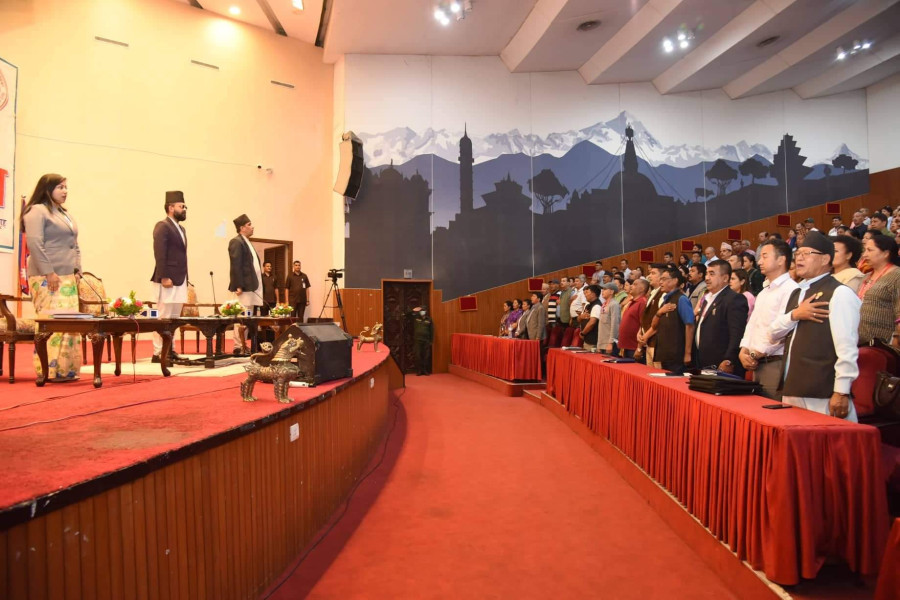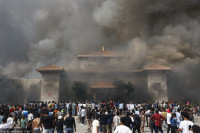Kathmandu
Local representatives draw flak for prioritising personal benefits over City’s public needs
During Tuesday’s municipal meeting some representatives demanded gold badges, uniform, and tea-making staff.
Anup Ojha
The Kathmandu Metropolitan City is burdened with several problems from poor infrastructure, air pollution, traffic congestion and drinking water crisis to garbage disposal. Also there is the risk of disease outbreaks and frequent interruptions in electricity supply in some areas.
The residents of the City live with major inconveniences without recourse; all the while trusting the local representatives to solve these issues.
However, these pressing issues do not feature on the to-do list of the newly-elected representatives who assumed their offices a month ago as was apparent in the ‘fifth municipal executive meeting’ that was broadcast live on Tuesday through City’s metro news.
On the very first day after assuming office, Mayor Balen Shah had announced to telecast live the executive meetings of the City. The City had its first executive meeting with the new leadership on May 30.
Instead of focussing on people’s issues, the elected representatives used Tuesday's meeting to put forth their own demands.
Hira Lal Tandukar, ward chairperson of Ward No 11, asked the City to make badges made of gold and silver for ward chairs. He also suggested using 5.83 gm of gold (half a tola) and 11.66 gm of silver (one tola) per badge. He also asked for uniforms for City officials depending on their ranks.
Moving a step further, Tandukar, who was elected ward chair second time in the local level election held on May 13, also asked for badges for ward members although less expensive. “I request this meeting chair to make badges for ward members too with 2.3 gm approx (four anna) of gold and 11.66 gm (one tola) of silver,” he said. He has asked the City to bear the cost of the badges including their making charge. “I had proposed this during my last tenure too,” he said.
Meanwhile, the chairman of Ward 5, Birendra Prajapati, complained of not having enough staff in his office. In the live telecast, he can be heard saying he does not have ‘a helper to make tea’ and asked for additional support staff.
Basanta Acharya, information officer at the City, said the KMC has divided all its 32 wards into three categories—large, medium and small—based on the population density and the area. He said Ward 5 falls under the small ward category; and therefore, qualifies to have 8-9 staff members including the ward chair and members.
“The ward offices do need additional staff but we have seen that most wards do not use their human resources efficiently,” said Acharya, who is also the chief of the law division of the City.
According to him, KMC has a total of 2,200 administrative positions but is currently manned by just 1,600 staff.
“But it does not suit elected representatives to demand personal staff when many basic needs of the public have yet to be addressed,” said Acharya.
Members of the public who watched the meeting on the internet and television criticised the elected representatives for pushing their own agendas instead of focussing on resolving issues faced by the public.
One viewer, Jekin Kirat, commented during the live feed that the ward representatives of Kathmandu should look no further than Dharan at the newly-elected mayor Harka Sampang, for word of advice. Another commentator, Bhuwan Mishra, left a sarcastic comment on the live feed: “The KMC should now announce a public tender to make tea for its representatives.”
The chairman of ward-30, Dal Bahadur Karki, also demanded uniforms for ward representatives for their identification and to “keep the prestige” of the elected officials in public.
During the meeting, a few elected representatives criticised the personal demands made by their colleagues. “We were elected by the people to serve. We are not here to enjoy any kind of benefit at the expense of the taxpayer money,” said Mukunda Risal, chairperson of Ward No 16.
Meanwhile, ward representatives had raised the issues of garbage, defunct street lamps in different wards and the municipal police’s approach to handling of street vendors last week.
Elected officials prioritising their personal demands to the City over the well-being of the general public is not new in Kathmandu Metropolitan City. During the tenure of former mayor Bidya Sundar Shakya, in the first executive meeting itself, he decided to buy smartphones worth Rs 30,000 each for all ward chairs, and more expensive ones for himself and the deputy mayor.




 17.12°C Kathmandu
17.12°C Kathmandu.jpg)










